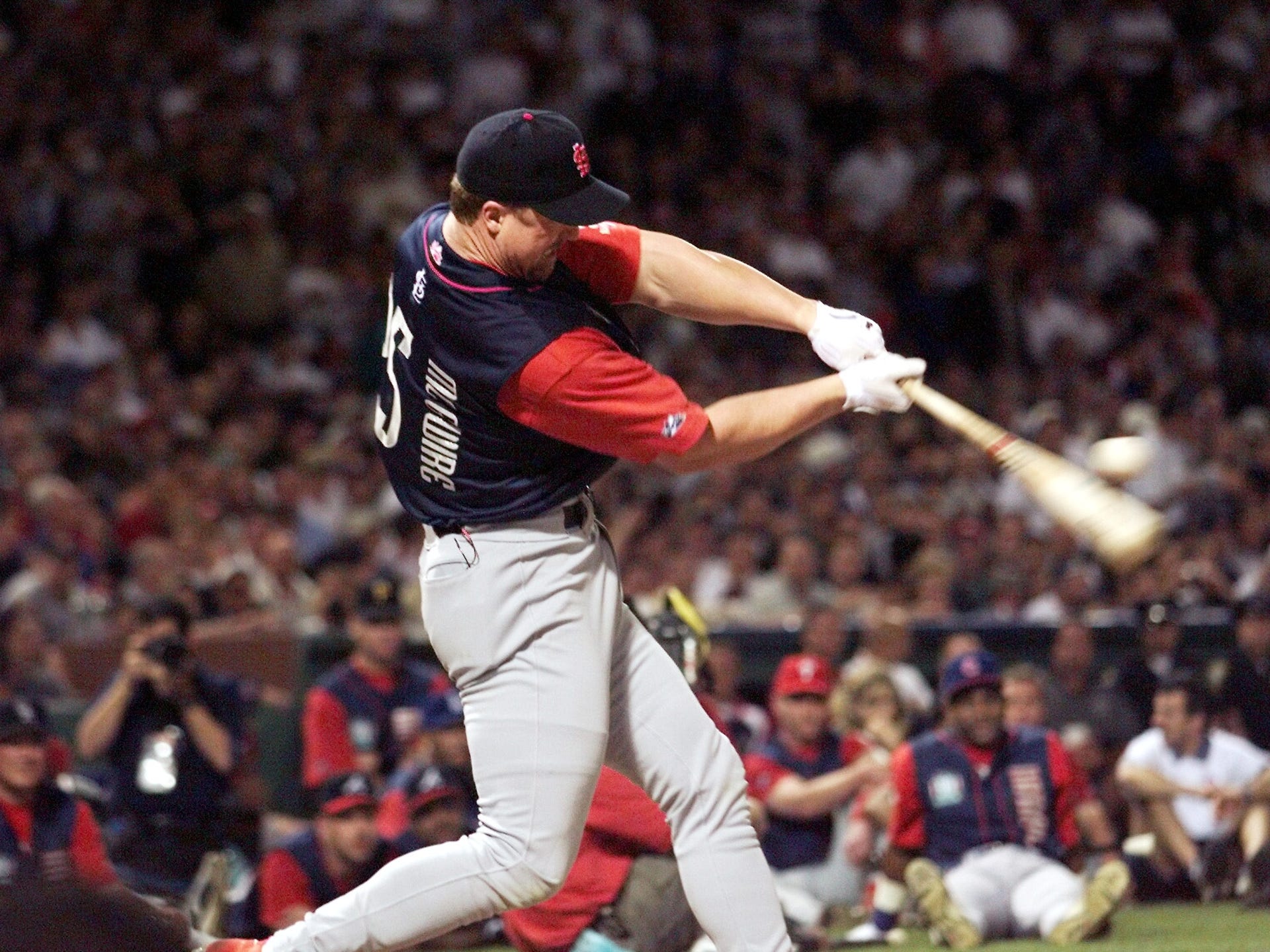NEW YORK –Baltimore Orioles first baseman Chris Davis enters tonight's Home Run Derby with homers in each of his last four regular season games and an American League record-tying total of 37 at the All-Star break.
He's on pace for 62 home runs over a full season. No player has hit that many in a season since Barry Bonds set the all-time record of 73 in 2001.
With the numbers of Bonds, Mark McGwire and Sammy Sosa treated with suspicion because of their connections to performance enhancing drugs, many fans – Davis included -- still hold up Roger Maris as the untainted standard.
ALL-STAR GAME LINEUPS: Youth reigns
"In my opinion, 61 is the record," he says, "and I think most fans agree with me on that." It's a sentiment he's referenced on more than one occasion, but it carries more weight now that he's one of eight sluggers in the Derby spotlight.
And as the major league home run leader, Davis now has to face speculation and questions of whether or not he's using PEDs.
"I was a little frustrated at first just at the thought anybody would even question it," he says. "But I understand it comes with the territory.
"I think any time you're being asked about something, you want to be open and honest about it. I've got nothing to hide," he says. "I want people to know that. I want people to feel like they can get behind me."
VIDEO: All-Star Game preview panel
Nothing in baseball carries quite the impact – or stirs debate – more than the home run.
If Davis can continue his pace, the milestones will become even more important, especially if Davis approaches Maris' total of 61.
"The record is 73. Who cares what he thinks?" Orioles teammate Adam Jones chuckles half-jokingly. "Everything's in the eye of the beholder. The game has changed on different levels … I don't care. The record is what it is."
Meanwhile, Tigers outfielder Torii Hunter refuses to be pulled into the debate.
"I'm staying away from that one, boy. That's a hot tamale. Barry's 73, Mark McGwire's 70 … that was impressive," Hunter says. " I know you guys know that was a different era, I don't know what era you call it, I definitely think what Barry and Mark McGwire and Sammy were all linked, but that's impressive. I don't care what they did, cheated or whatever. You still got to hit the ball."
PHOTOS: BEST MOMENTS IN HOME RUN DERBY HISTORY
For one night a year, the nation's love affair with the long ball gets the spotlight to itself. Despite being the leading vote-getter in the American League and starting Tuesday's game at first base, Davis says the Derby is the best part of the All-Star festivities.
"As a young kid, I watched it all the time. It's something that I've always wanted to be a part of and now that I'm here and going to be a part of it, it's kind of surreal," he says.
Davis has always been the kind of boom-and-bust hitter the Derby is designed to showcase.
Before the Orioles acquired him two seasons ago in a trade deadline deal with the Texas Rangers, the boom took place mostly in the minor leagues while the busts came after he was promoted to the majors.
With Texas, he was a .252 hitter who struck out in nearly one-third of his plate appearances. But over six seasons in the minors, he hit .318 (with a .597 slugging percentage) and struck out less than one-quarter of the time.
Several more common reasons could better help explain his rise to be the game's top power hitter.
He hasn't had to worry about seeing his name in the lineup card every day. The security that comes with regular playing time can make it much easier to forget about the 0-for-4s … or even the 0-for-17 stretches.
There's also some statistical basis for his improvement. He's not chasing balls out of the strike zone as much as he has in the past (just 35.4% according to Fangraphs.com).
"I learned how to be a little more patient at the plate," he says. "I used to think when I got up to the plate I had to hit a home run before I got two strikes because there was no way I was going to put the ball in play.
"I think I've grown as a hitter," he says. "I think I've obviously matured. I've learned a little more about myself and the strike zone and I've really learned to be patient."
As a result, his walk rate (6.8%) is better than it's ever been and his 28% strikeout rate – while still high for even a power hitter – is the lowest it's been since his rookie year.
Add in a significant increase in hard-hit balls – and all the elements have come together for a historic power season.
So far.
On the national stage, Davis will have an opportunity tonight to show exactly how far his power-hitting skills have developed. And possibly provide a glimpse of historic heights to come.
A.M. Hempler
Work With Me
PS: The "Secret Formula" That Took Me From Being Over $40,000 in Debt, to Traveling Around The World and Making a 6-Figure Income From My Computer


No comments:
Post a Comment